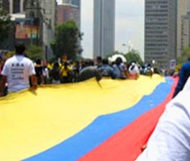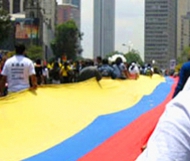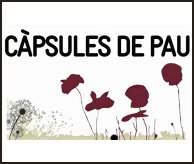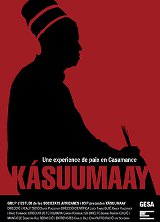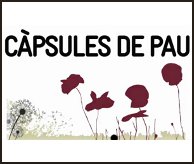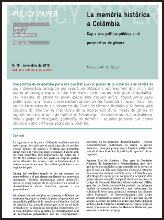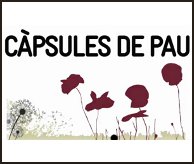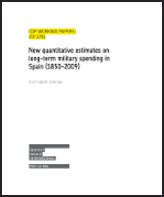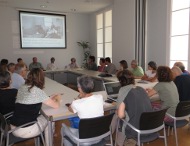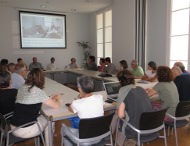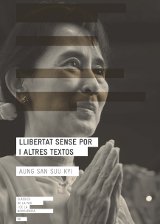The president of ICIP, Rafael Grasa, is meeting this week with representatives of the Colombian Federation of Municipalities , the City Council of Medellín , and the Chamber of Commerce of Bogotá to sign collaboration agreements between ICIP and these institutions. The objective of these agreements is for ICIP to support training activities related to peacebuilding and conflict transformation at a key moment in the history of Colombia, with peace negotiations currently underway between the government of Juan Manuel Santos and the FARC guerrilla group.
During his stay in Colombia, the president of ICIP will also participate as an expert in various activities related to peacebuilding. On November 20, Rafael Grasa will give a conference entitled “Peacebuilding and development: processes and lessons learned over the past few decades” at Our Lady of the Rosary University’s School of International Relations. Then, on November 21, he will participate as a speaker at the international seminar “How do you build peace after the signing of an agreement?” at the University of Antioquia. Finally, on November 25, he will give a conference entitled “Chair for peace” at the Externado University as part of the Sixth Memory Week.
Author: whads
ICIP signs collaboration agreements with various institutions of Colombia
The president of ICIP, Rafael Grasa, is meeting this week with representatives of the Colombian Federation of Municipalities , the City Council of Medellín , and the Chamber of Commerce of Bogotá to sign collaboration agreements between ICIP and these institutions. The objective of these agreements is for ICIP to support training activities related to peacebuilding and conflict transformation at a key moment in the history of Colombia, with peace negotiations currently underway between the government of Juan Manuel Santos and the FARC guerrilla group.
During his stay in Colombia, the president of ICIP will also participate as an expert in various activities related to peacebuilding. On November 20, Rafael Grasa will give a conference entitled “Peacebuilding and development: processes and lessons learned over the past few decades” at Our Lady of the Rosary University’s School of International Relations. Then, on November 21, he will participate as a speaker at the international seminar “How do you build peace after the signing of an agreement?” at the University of Antioquia. Finally, on November 25, he will give a conference entitled “Chair for peace” at the Externado University as part of the Sixth Memory Week.
What is Peace to Ljuljetta Goranci?
A new video of the project ‘Peace Capsules’ , coproduced by ICIP and Col·lectiu Contrast, has been published this week on the ICIP website. It is a short one minute long video entitled ‘What is Peace to Ljuljetta Goranci?’ and in which Goranci, director of Nansen Dialogue Centre from Bosnia Herzegovina, considers what peace means to her. The video is accessible both on the ICIP website and on the ICIP Youtube Channel .
Until the 21st September 2014, International Day of Peace, ICIP will publish a new video capsule each week. Each capsule will count with the participation of an activist, actor or academic who will think of what peace means to him/her. The aim of the project is to compile different approximations to the concept ‘peace’ on the ICIP web site.
Kásuumaay, an experience of peace in Casamance
The documentary Kásuumaay, une experiencie de paix en Casamance, has been directed by Xavier Puigserver and it describes the singularity of the kingdom of Oussouye, a territory in Casamance (South Senegal) which goes on with its life beyond the violence that disrupts the region.
In fact, the conflict between the Movement of Democratic Forces of Casamance and the Senegalese Army has been going on for over 30 years now, despite some partial peace treaties.
The film narrates the struggle of King Sibilumbay to bring Kásuumaay (which means ‘Peace’ in the language of the Joola ethnic group) to the Kingdom of Oussouye after he was enthroned in the territory in 2000, and it highlights the role that folklore and tradition authorities play in African societies.
This work is a co-production of ICIP (by means of a RI-ICIP project grant ) and the Study Group of African Societies – Barcelona University (GESA). The film will be presented in Lisbon on the 28th June, within the 5th European Conference on African Studies.
What is Peace to Kada Hotic?
A new video of the project ‘Peace Capsules’ , coproduced by ICIP and Col·lectiu Contrast, has been published this week on the ICIP website. It is a short one minute long video entitled ‘What is Peace to Kada Hotic?’ and in which Kotic, a member of Mothers of Srebrenica and Zepa Association, considers what peace means to her. The video is accessible both on the ICIP website and on the ICIP Youtube Channel .
Until the 21st September 2014, International Day of Peace, ICIP will publish a new video capsule each week. Each capsule will count with the participation of an activist, actor or academic who will think of what peace means to him/her. The aim of the project is to compile different approximations to the concept ‘peace’ on the ICIP web site.
Call for nominations for ICIP Peace in Progress Award 2013
The International Catalan Institute for Peace (ICIP) has announced the call for nominations for the third edition of the ICIP Peace in Progress Award. This prize aims to publicly recognize individuals, entities or institutions that, in an outstanding and extensive manner, have worked and contributed to the promotion and building of peace. To be considered for the award, nominations must be submitted between April 12 and June 29. If you need more information please contact ICIP by sending an email to icip@gencat.cat or by phoning 93 554 42 70.
The ICIP Peace in Progress Award consists of public recognition, a sculpture created by the Nobel Peace Prize winner, artist and activist, Adolfo Pérez Esquivel, called Porta del sol, and 4,000 euros.
The first edition of the ICIP Peace in Progress Award , corresponding to the year 2011, recognized the struggle of conscientious objectors and insubmisos (people who refuse to do military service or any substitute social work), symbolized in Pepe Beunza, first conscientious objector for ideological reasons in Spain.
In 2012, the ICIP Peace in Progress Award was granted to five “Madres de Soacha” (Mothers of Soacha) for their fight for peace and human rights in Colombia. With this Award, ICIP wanted to recognise the courage and exemplariness in their claim for truth, justice and repair after the extrajudicial killings of their sons by the Colombian security forces in the so-called “falsos positivos”incident.
Before that, in October, a special edition of the award was presented to the Parliament of Catalonia for representing the continuity and legacy of the institutions Pau i Treva and Consolat de Mar.
How to send in your nomination?
Nominations must be submitted before 29 June 2013 both electronically (icip@icip.cat) and in paper format, delivering it the ICIP office (Gran Via de les Corts Catalanes, 658, 08010, Barcelona, Spain), notwithstanding the provisions of Article 38.4 of Law 30/1992, of 26 November 1992, on the Legal Regime of Public Administrations and Common Administrative Procedures.
This means that nominations may, for example, be handed in and registered at Spanish post offices or at official organs of the Spanish Public Administration with “registros administrativos”, including administrative organs that belong to the General State Administration, Administration of the Autonomous Communities, Administration of the Provincial Councils, and the Local Governments.
Sending in a nomination from outside of Spain can be done by handing in and registering the documentation at one of the Diplomatic Representations of consular offices of Spain abroad or by sending it by regular mail. It should be noted, however, that if the nomination is send by mail, it will be registered with the date on which the documentation reaches the ICIP office; whereas registration at a diplomatic consular post shall be with the date of presentation at the consular office. Moreover, ICIP does not accept any responsibility in case the nomination is lost or misplaced in the mail and therefore not registered before the deadline for submitting applications.
Historical memory in Colombia. Towards a public policy from a gender perspective
What is Peace to Godeliève Mukasarasi?
From now and until the 21st September 2014, International Day of Peace, ICIP will publish a new video capsule each week. Each capsule will count with the participation of an activist, actor or academic who will think of what peace means to him/her. The aim of the project is to compile different approximations to the concept ‘peace’ on the ICIP web site.
‘New quantitative estimates on long-term military spending in Spain (1850-2009)’
Banning Nuclear Weapons; the only solution
Nowadays, there are nearly 20.000 nuclear weapons spread around the world, 2.000 of which are ready to be used at any moment. These are the most destructive instruments and with the most indiscriminate effects ever created, with devastating medical, environmental, social and cultural consequences. The current nuclear capacity, mostly in the hands of the United States and Russia, is equivalent to 100.000 Hiroshima nuclear bombs, sufficient to end with all forms of life in the planet several times. A very threatening reality that was denounced last Thursday 11th July in the debate organized by the International Catalan Institute for Peace (ICIP), FundiPau and the Centre for Peace Studies JM Delàs within the framework of the Nuclear Abolition Week.
The event counted with the participation of Robert Jacobs, researcher at the Hiroshima Peace Centre, who focused on the effects of nuclear testing and on the consequences of the accidents in nuclear power plants, such as the Fukushima one in March 2011. Over 2000 nuclear testing have been carried out around the globe since 1945, which entails high level of radiation and serious consequences over the population in the long term: consequences on people’s health – radiation fallout contaminates the atmosphere and causes illnesses such as cancer—but also social and cultural consequences. According to Jacobs, ‘in many locations where nuclear testing have been carried out, local inhabitants have been forced to evacuate; this means that they have been disconnected from their way of life and traditions, and that they have lost their social independence and their dignity, as they are then identified as contaminated persons’.
Nuclear colonialism
All through nuclear history, the most affected by the consequences of radiations have been the socially marginalized populations; this is what Jacobs calls nuclear colonialism: ‘France has never tested near Paris, but in Alger and the Polynesia; and Russia has carried out their testing in Kazakhstan, where people still live in contaminated areas and still eat contaminated horse meat’.
Banning, the only solution
The perils of nuclear weapons are due to their own existence, and the only guarantee against their proliferation is to eliminate them. In this sense, researcher of the Centre for Peace Studies JM Delàs, Xavier Bohigas, highlighted that ‘nuclear bombs are a threat even if they are not used, as the necessary elements for their production are already highly radioactive’. Bohigas also stated that this type of weapons is ‘an aberration’ because of the pubic expenses that they entail (105 billion dollars in 2011), and affirmed that the only solution is to ban nuclear weapons.
Director of FundiPau, Jordi Armadans, presented the International Campaign to Abolish Nuclear Weapons (ICAN), of which both FundiPau and Centre JM Delàs are members. The campaign is present in 60 countries and defends the necessity of a treaty to abolish nuclear weapons. According to Armadans, the objective of the campaign is ‘terribly ambitious’ taking into account that it has taken 15 years of hard fight to regulate the trade of conventional weapons with the recently approved Arms Trade Treaty. However, and despite the difficulties, he defended that it is necessary to face the challenge and highlighted the importance of the active participation of the peace movement in this campaign. Currently, 150 countries support the ban on nuclear weapons.
Banning Nuclear Weapons; the only solution
Nowadays, there are nearly 20.000 nuclear weapons spread around the world, 2.000 of which are ready to be used at any moment. These are the most destructive instruments and with the most indiscriminate effects ever created, with devastating medical, environmental, social and cultural consequences. The current nuclear capacity, mostly in the hands of the United States and Russia, is equivalent to 100.000 Hiroshima nuclear bombs, sufficient to end with all forms of life in the planet several times. A very threatening reality that was denounced last Thursday 11th July in the debate organized by the International Catalan Institute for Peace (ICIP), FundiPau and the Centre for Peace Studies JM Delàs within the framework of the Nuclear Abolition Week.
The event counted with the participation of Robert Jacobs, researcher at the Hiroshima Peace Centre, who focused on the effects of nuclear testing and on the consequences of the accidents in nuclear power plants, such as the Fukushima one in March 2011. Over 2000 nuclear testing have been carried out around the globe since 1945, which entails high level of radiation and serious consequences over the population in the long term: consequences on people’s health – radiation fallout contaminates the atmosphere and causes illnesses such as cancer—but also social and cultural consequences. According to Jacobs, ‘in many locations where nuclear testing have been carried out, local inhabitants have been forced to evacuate; this means that they have been disconnected from their way of life and traditions, and that they have lost their social independence and their dignity, as they are then identified as contaminated persons’.
Nuclear colonialism
All through nuclear history, the most affected by the consequences of radiations have been the socially marginalized populations; this is what Jacobs calls nuclear colonialism: ‘France has never tested near Paris, but in Alger and the Polynesia; and Russia has carried out their testing in Kazakhstan, where people still live in contaminated areas and still eat contaminated horse meat’.
Banning, the only solution
The perils of nuclear weapons are due to their own existence, and the only guarantee against their proliferation is to eliminate them. In this sense, researcher of the Centre for Peace Studies JM Delàs, Xavier Bohigas, highlighted that ‘nuclear bombs are a threat even if they are not used, as the necessary elements for their production are already highly radioactive’. Bohigas also stated that this type of weapons is ‘an aberration’ because of the pubic expenses that they entail (105 billion dollars in 2011), and affirmed that the only solution is to ban nuclear weapons.
Director of FundiPau, Jordi Armadans, presented the International Campaign to Abolish Nuclear Weapons (ICAN), of which both FundiPau and Centre JM Delàs are members. The campaign is present in 60 countries and defends the necessity of a treaty to abolish nuclear weapons. According to Armadans, the objective of the campaign is ‘terribly ambitious’ taking into account that it has taken 15 years of hard fight to regulate the trade of conventional weapons with the recently approved Arms Trade Treaty. However, and despite the difficulties, he defended that it is necessary to face the challenge and highlighted the importance of the active participation of the peace movement in this campaign. Currently, 150 countries support the ban on nuclear weapons.
‘Llibertat sense por i altres escrits’, by Aung San Suu Kyi
Llibertat sense por i altres escrits is the translation of the classic Freedom from Fear of the Peace Noble Prize Aung San Suu Kyi, and has been co-published by ICIP and Angle Editorial within the ICIP book collection ‘Classics of Peace and Nonviolence’.
The book compiles the most forceful speeches, moving correspondence, direct interviews and thoughtful texts of Suu Kyi, symbol of the opposition to the Burmese military rule despite being under home confinement for nearly 20 years. The texts reflect her commitment to and nonviolent fight for freedom, dignity, democracy and human rights.
Llibertat sense por i altres escrits includes a prologue by Maria Lluïsa Panelas as well as the prologues of Václav Havel, to the first edition of the book, and Desmond Tutu, to its second edition.
The author
Aung San Suu Kyi (Burma 1945) is an emblematic symbol of the Burmese opposition to the fifty-year-long military rule (1962-2011). Her nonviolent fight for democracy has granted her several prizes such as The Sakharov Prize for Freedom of Thought (1990), the Nobel Peace Prize (1991), the Solidaritat Prize (1994), the Olof Palme (2005) and the Internacional de Catalunya Award (2008), among others.
The collection
The collection ‘Classics of Peace and Nonviolence’ wishes to continue in the spirit of the fundamental works it includes and to make a contribution to the progressive growth of a culture of peace and the corresponding eradication of sociopolitical violence today. Other titles within the collection are El valor humà de la pau i altres textos inèdits , by Lluis Maria Xirinacs; Sobre la violència (On Violence), by Hannah Arendt; or Tres Guinees (Three Guineas), by Virginia Woolf.

